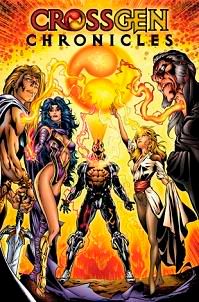 I was checking my hits the other day and saw that I had received some hits from an August post on James Meeley’s Comic Asylum in which James discussed whether or not the heroes of the late CrossGen were "really superheroes in disguise."
I was checking my hits the other day and saw that I had received some hits from an August post on James Meeley’s Comic Asylum in which James discussed whether or not the heroes of the late CrossGen were "really superheroes in disguise."I think James hit the nail on the head when he wrote:
I think the real issue here, is how indelible the superhero formula has been imprinted onto the pop-culture landscape. And that it now has become much more than merely a segment of sci-fi storytelling, but has evolved into an entity unto itself. An unfortunate side-effect of this, is that other types of sci-fi, which use elements of concepts people see as “superhero” in their reference, automatically makes THAT work a “superhero concept.” But that simply isn’t true.
Calling the main characters of CrossGen “superheroes in disguise” is interesting. It reminds me of a PvP strip (I could track down the url of the exact strip, but life is too short) where Francis mentions that Wizards of the Coast should sue J.R.R. Tolkien for swiping all their D&D ideas for The Lord of The Rings.
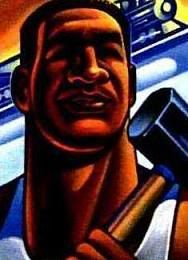 In other words, stories like the ones told in CrossGen’s books have been told a lot longer than action-packed soap operas featuring gaudily garbed crimefighters. The idea of individuals blessed with supernatural abilities aren’t confined to the 20th and 21st centuries. I’ve said it before and I’ll say it again: the roots of the superhero go back further than the Bible. Myth and legend is filled with super-powered characters fighting for what they think is right, and the proof can be found in our comics if nowhere else with characters like Doc Samson, Orion and Steel (a.k.a. John Henry) named after ancient heroes; or more blatantly with characters like Thor and Hercules who are pulled directly from the myths to which the aforementioned heroes merely pay homage. If you call the heroes of CrossGen "superheroes in disguise" you may as well say the same about all the legendary figures I just mentioned and many more; and while you’re at it you can brand Frankenstein’s Monster, Dracula and Hannibal Lecter "supervillains in disguise."
In other words, stories like the ones told in CrossGen’s books have been told a lot longer than action-packed soap operas featuring gaudily garbed crimefighters. The idea of individuals blessed with supernatural abilities aren’t confined to the 20th and 21st centuries. I’ve said it before and I’ll say it again: the roots of the superhero go back further than the Bible. Myth and legend is filled with super-powered characters fighting for what they think is right, and the proof can be found in our comics if nowhere else with characters like Doc Samson, Orion and Steel (a.k.a. John Henry) named after ancient heroes; or more blatantly with characters like Thor and Hercules who are pulled directly from the myths to which the aforementioned heroes merely pay homage. If you call the heroes of CrossGen "superheroes in disguise" you may as well say the same about all the legendary figures I just mentioned and many more; and while you’re at it you can brand Frankenstein’s Monster, Dracula and Hannibal Lecter "supervillains in disguise."There are a lot of places where CrossGen’s principles diverged from the superheroes of the Big Two, and James mentioned some of these differences. For me, the fundamental difference - which happens to be one of the big reasons why at one point I was collecting all of CrossGen’s books - was that CG’s story concepts were much more finite than those of Marvel and DC.
There are many reasons why superheroes have dominated the comic book market, and of course the puritanical Comics Code probably has more to do with it than anything else. However, I think another reason is that the simplicity of the concept lends itself to a greater range of stories. "Guy wears funny costume and fights evil." There’s no limit to the amount of stories you can get out of that, even if you’re essentially telling the same stories again and again, and the superhero supremacy of the comics industry is proof of it. The source of Batman’s enduring popularity is one of the best examples of the malleability of the superhero. His lack of super-powers makes him well-suited for the "street level" superhero stories, his dark stylization fits him comfortably in horror or mystery noir, while the very fact that he wears a funny costume gains him entrance to the world-threatening or cosmic stories. You can put him in a kung-fu movie or a spy thriller. You can have him put away crack dealers or hunt vampires. You can blast him off into space or send him back in time. There isn’t a single genre in action-adventure fiction where Batman can’t find a home.
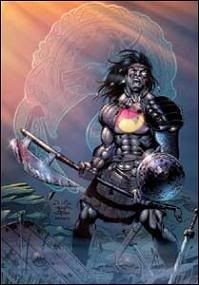 CG’s concepts were much more finite. If you write Brath, you have a problem a Batman writer doesn't have. I mean, eventually Brath has to either win the war or lose the war, right? Lady Sin has to have revenge on the pirates, Sephie has to beat her Uncle, and Ethan has to make peace between the Herons and Ravens. Otherwise you risk making your readers feel like you’re on a Gilligans Isle track, with no intention of letting any of your stories get off the proverbial island. And if you do let them off the island, what do you do then? Do you end the series, thereby (assuming it had healthy sales) cutting off a source of profit, or do you drastically change the essence of the story; which could spell doom for your title if dedicated readers don't gel with the new direction? Once the cast of Sojourn assembles that magic arrow and kills Mordath, does he come back to life again or is he replaced by a new tyrant? If the folks in Sigil finally defeat the Saurians, do they come up with another alien race to wage war against, or do the assembled heroes decide to just go Star Trekking? With Brath’s rebellion successful, does the book turn into a West Wing for barbarians? Not counting the various limited series connected or disconnected from the "Sigilverse", out of all CG’s titles, the only ones whose concepts could have been milked without limit were Ruse (just a really good whodunnit book while Waid was on the title and his departure saw not only a break from the whodunnit feel but also a drastic drop in quality), The First (basically a 90210 for the gods), and maybe Mystic (a woman trying to deal with the consequences of her powers: Marvel’s X-books have gotten substantial bank from similar concepts).
CG’s concepts were much more finite. If you write Brath, you have a problem a Batman writer doesn't have. I mean, eventually Brath has to either win the war or lose the war, right? Lady Sin has to have revenge on the pirates, Sephie has to beat her Uncle, and Ethan has to make peace between the Herons and Ravens. Otherwise you risk making your readers feel like you’re on a Gilligans Isle track, with no intention of letting any of your stories get off the proverbial island. And if you do let them off the island, what do you do then? Do you end the series, thereby (assuming it had healthy sales) cutting off a source of profit, or do you drastically change the essence of the story; which could spell doom for your title if dedicated readers don't gel with the new direction? Once the cast of Sojourn assembles that magic arrow and kills Mordath, does he come back to life again or is he replaced by a new tyrant? If the folks in Sigil finally defeat the Saurians, do they come up with another alien race to wage war against, or do the assembled heroes decide to just go Star Trekking? With Brath’s rebellion successful, does the book turn into a West Wing for barbarians? Not counting the various limited series connected or disconnected from the "Sigilverse", out of all CG’s titles, the only ones whose concepts could have been milked without limit were Ruse (just a really good whodunnit book while Waid was on the title and his departure saw not only a break from the whodunnit feel but also a drastic drop in quality), The First (basically a 90210 for the gods), and maybe Mystic (a woman trying to deal with the consequences of her powers: Marvel’s X-books have gotten substantial bank from similar concepts).Ironically, while CG’s relatively limited concepts (as far as translating into ongoing, successful titles) may not have brought in the dough, and while I don’t agree with the idea that the characters were merely "superheroes in disguise", these finite concepts are exactly what I’m hungry for in superhero titles. Ask me to name my favorite superhero comics, and it’s likely the list I come up with will be filled with limited series whose characters and plots never saw the light of day after the initial limited series ended (Watchmen), or ongoing monthlies that - in spite of the fact that they were ongoing - harbored concepts that dictated the story would have to eventually end (Sleeper, Starman).
Somewhat related to the subject, just yesterday over at Sleep is for Suckers, Joel Hunt wrote the following about the popularity of Starman:
I think it’s very telling that, although Starman was a very popular series, and Jack Knight a compelling and complex character, the series was ended with such grace and panache that there hasn’t really been very much outcry for its return.
While I came late to the party for Starman and have yet to read the entire series, it seems likely that the reason there’s been no call for a follow-up is the same reason there’s been no call for sequels to Watchmen or Sleeper.
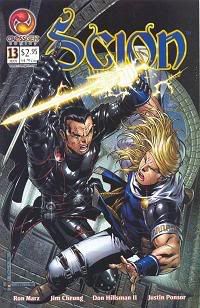 Like the aforementioned series, the characters of CrossGen were characters. The stories of CrossGen were stories. The stories of Batman and Superman and Spider-Man aren’t stories. Hulk and Wonder Woman and the Flash aren’t characters. Stories that don’t end aren’t stories. Characters that never die, that either never change or change only to suit the will of the wallet, aren’t characters. Batman isn’t still on the rack in over a dozen books every month because it’s part of the natural progression of a complex character, despite the fact that by now he should either be dead or at least too old to have anything exit his body without a catheter. He’s there because he’s NOT a character. He’s an icon. More importantly, he’s a franchise. That isn’t to say that good stories about Batman can’t or won’t be told, or aren’t being told right now, but he ain’t a character. You can fulfill your addictive need for his continuing exploits every month, but the epic nature of the superhero’s ancient roots are lost. Ulysses is never going to find his way home. He’s just going to keep going and going and going. If anything the heroes of CrossGen were taking a step back in the world of the superhero; recpaturing the epic, dismissing the ongoing crimefighting formula, rejecting the black-and-white morality, and acting as honest-to-God characters rather than springboards for action figure sales and film options.
Like the aforementioned series, the characters of CrossGen were characters. The stories of CrossGen were stories. The stories of Batman and Superman and Spider-Man aren’t stories. Hulk and Wonder Woman and the Flash aren’t characters. Stories that don’t end aren’t stories. Characters that never die, that either never change or change only to suit the will of the wallet, aren’t characters. Batman isn’t still on the rack in over a dozen books every month because it’s part of the natural progression of a complex character, despite the fact that by now he should either be dead or at least too old to have anything exit his body without a catheter. He’s there because he’s NOT a character. He’s an icon. More importantly, he’s a franchise. That isn’t to say that good stories about Batman can’t or won’t be told, or aren’t being told right now, but he ain’t a character. You can fulfill your addictive need for his continuing exploits every month, but the epic nature of the superhero’s ancient roots are lost. Ulysses is never going to find his way home. He’s just going to keep going and going and going. If anything the heroes of CrossGen were taking a step back in the world of the superhero; recpaturing the epic, dismissing the ongoing crimefighting formula, rejecting the black-and-white morality, and acting as honest-to-God characters rather than springboards for action figure sales and film options. I think we deserve an end to these characters, because how can you appreciate a story fully until it comes to an end? It seems like, while they’re understandably unwilling to gut their franchises, the Big Two realize there’s a need for an ending, which is part of the reason why we get books like DKR , Peter David’s The Last Avengers Story, and Marvel’s various The End books. It’s part of why readers are enthralled by Elseworld/What If books and alternate reality tales. Divorced from standard continuities, they’re the only places where readers can get any kind of ending for their favorite characters. It’s an interesting paradox, really. I’m not ignorant of the fact that most readers would want my head for proposing the ending of favorite superheroes, but at the same time I’d wager most of those same readers are intrigued by the idea of getting a peek at how their heroes’ stories would eventually find a conclusion. As I’ve written so many times on the Net that if I were anyone of note people would probably tell me stop repeating myself, until someone convinces me that there’s anymore Hulk stories worth telling, I’ll continue to consider The Incredible Hulk #467 the character’s final story.
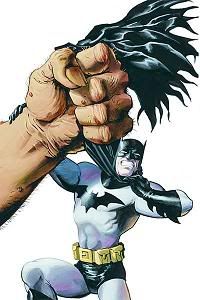 It’s one of the main reasons why I only read tpbs these days. As long as the collected stories are (more or less) self-contained, while I may not get an end to the story of Captain America or Wonder Woman, at least I get an ending to THAT story. There’s no way in hell I’m going to pick up any or all of Batman’s monthly offerings, but I’ll gladly pick up the tpbs for the stories Matt Wagner’s putting out right now. Speaking of Wagner, while I’ve read a lot of complaints on the net about Geoff Johns’s apparent failure at depicting the Doctor Mid-Nite of Wagner’s limited series, I’ll never have to know either way because while I’ve got Wagner’s Doctor Mid-Nite tpb, it would take one very drunk day in the comic shop for me to spend money on JSA.
It’s one of the main reasons why I only read tpbs these days. As long as the collected stories are (more or less) self-contained, while I may not get an end to the story of Captain America or Wonder Woman, at least I get an ending to THAT story. There’s no way in hell I’m going to pick up any or all of Batman’s monthly offerings, but I’ll gladly pick up the tpbs for the stories Matt Wagner’s putting out right now. Speaking of Wagner, while I’ve read a lot of complaints on the net about Geoff Johns’s apparent failure at depicting the Doctor Mid-Nite of Wagner’s limited series, I’ll never have to know either way because while I’ve got Wagner’s Doctor Mid-Nite tpb, it would take one very drunk day in the comic shop for me to spend money on JSA.For the fans who are already no doubt bemoaning the confirmation that their favorite Blue Beetle is dead for good, I’d say they should consider themselves unlucky only in the stupid way he died, not that he did.

3 comments:
Michileen:
Dude, this entry was sheer poetry. And I don't just say that, because one of my blogs was the inspiration of it.
You took my "groundwork" blog and built a beautiful piece or mental architecture upon it. All I can say is: Bravo! :)
Thanks for saying so, I appreciate it. It was a nice coincidence that I happened upon that entry on your blog (I don't know how I got a hit off it, since this blog didn't even exist in August), because it gave me the excuse to write about something I've been itching to take a crack at for a while.
Michileen:
Someone probably did a search for CrossGen and got that blog entry of mine. They then went over to the sidebar, which has since been updated with this place in the links. That's likely how you got the hit from that entry.
I think the best point you make as to why the CrossGen characters were superheroes in disguise, is that superheroes (especially the most iconic ones) will probably never have that definitive ending to their story, unlike what was planned for some (if not most) of the CrossGen characters. Great stuff.
Post a Comment